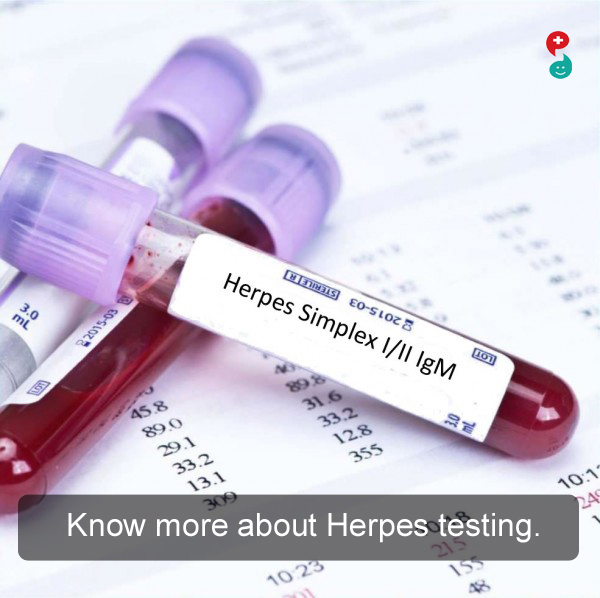
Herpes testing
There are different tests available for herpes. Viral culture and DNA tests can be done if you are experiencing symptoms. Blood tests are available for people who may not have had symptoms or if the signs have already healed.
Testing with symptoms
If symptoms of herpes appear, they can vary widely from person to person. If a person does experience signs of infection, we recommend obtaining a culture test (a swab from the symptom) within the first 48 hours after a lesion appears. Results are usually available in about a week’s time.
The major advantage of the culture is its accuracy in giving a positive result—generally, if you test positive by viral culture, you can be sure you have the virus. A culture can also be “typed” to determine whether the infection is caused by HSV-1 or HSV-2.
The major disadvantage of the culture is its high rate of false negatives. Because a culture works by requiring virus that is active, if a lesion is very small, or is already beginning to heal, there may not be enough virus present for an accurate culture. Beyond 48 hours of the symptoms appearing, there is a risk of receiving a false negative test result. Viral culture is even less accurate during recurrences (positive in only about 30% of recurrent outbreaks).
Healthcare providers can also take a swab of an area that has symptoms and run DNA tests—known as Nucleic Acid Amplification Testing (NAAT). These newer tests are fast, accurate, and can tell if a person has HSV-1 or HSV-2. There is less chance of a false negative result with NAATs. NAAT methods are the preferred method, with PCR as the most-widely used NAAT method.
Testing with no symptoms
Blood tests can be used when a person has no visible symptoms but has concerns about having herpes. Blood tests do not actually detect the virus; instead, they look for antibodies (the body’s immune response) in the blood.
IgM vs. IgG
When an individual contracts herpes, the immune system responds by developing antibodies to fight the virus: IgG and IgM. Blood tests can look for and detect these antibodies, as the virus itself is not in blood. IgG appears soon after infection and stays in the blood for life. IgM is actually the first antibody that appears after infection, but it may disappear thereafter.
IgM tests are not recommended because of three serious problems:
Many assume that if a test discovers IgM, they have recently acquired herpes. However, research shows that IgM can reappear in blood tests in up to a third of people during recurrences, while it will be negative in up to half of persons who recently acquired herpes but have culture-document first episodes. Therefore, IgM tests can lead to deceptive test results, as well as false assumptions about how and when a person actually acquired HSV. For this reason, we do not recommend using blood tests as a way to determine how long a person has had herpes. Unfortunately, most people who are diagnosed will not be able to determine how long they have had the infection.
In addition, IgM tests cannot accurately distinguish between HSV-1 and HSV-2 antibodies, and thus very easily provide a false positive result for HSV-2. This is important in that most of the adult population in the U.S. already has antibodies to HSV-1, the primary cause of oral herpes. A person who only has HSV-1 may receive a false positive for HSV-2.
IgM tests sometimes cross-react with other viruses in the same family, such as varicella zoster virus (VZV) which causes chickenpox or cytomegalovirus (CMV) which causes mono, meaning that positive results may be misleading.
The accurate herpes blood tests detect IgG antibodies. Unlike IgM, IgG antibodies can be accurately broken down to either HSV-1 or HSV-2. A recent study corroborates this finding: labs that used non-gG-based tests for herpes had high false-positive rates for HSV-2 antibodies (14-88% saying the blood sample was positive for HSV-2) in samples that were actually only positive for HSV-1 antibodies. But 100% of the labs using gG-based tests accurately reported that the blood sample was negative for HSV-2.
The challenge here is that the time it takes for IgG antibodies to reach detectable levels can vary from person to person. For one person, it could take just a few weeks, while it could ta ke a few months for another. So even with the accurate tests, a person could receive a false negative if the test is taken too soon after contracting the virus. For the most accurate test result, it is recommended to wait 12 – 16 weeks from the last possible date of exposure before getting an accurate, type-specific blood test in order to allow enough time for antibodies to reach detectable levels.
There are currently several FDA-approved, gG-based blood tests that can give accurate results for herpes. Like any blood test, these tests cannot determine whether the site of infection is oral or genital. However, since most cases of genital herpes are caused by HSV-2, a positive result for type-2 antibodies most likely indicates genital herpes.
For healthcare providers, we’ve developed the Herpes Testing Toolkit, which was reviewed by leading experts in this field. The resource explains the increasing role of type-specific herpes serologic assays, presents clinical scenarios in which serologic testing are beneficial, and reviews key factors in a differential diagnosis for genital herpes.







